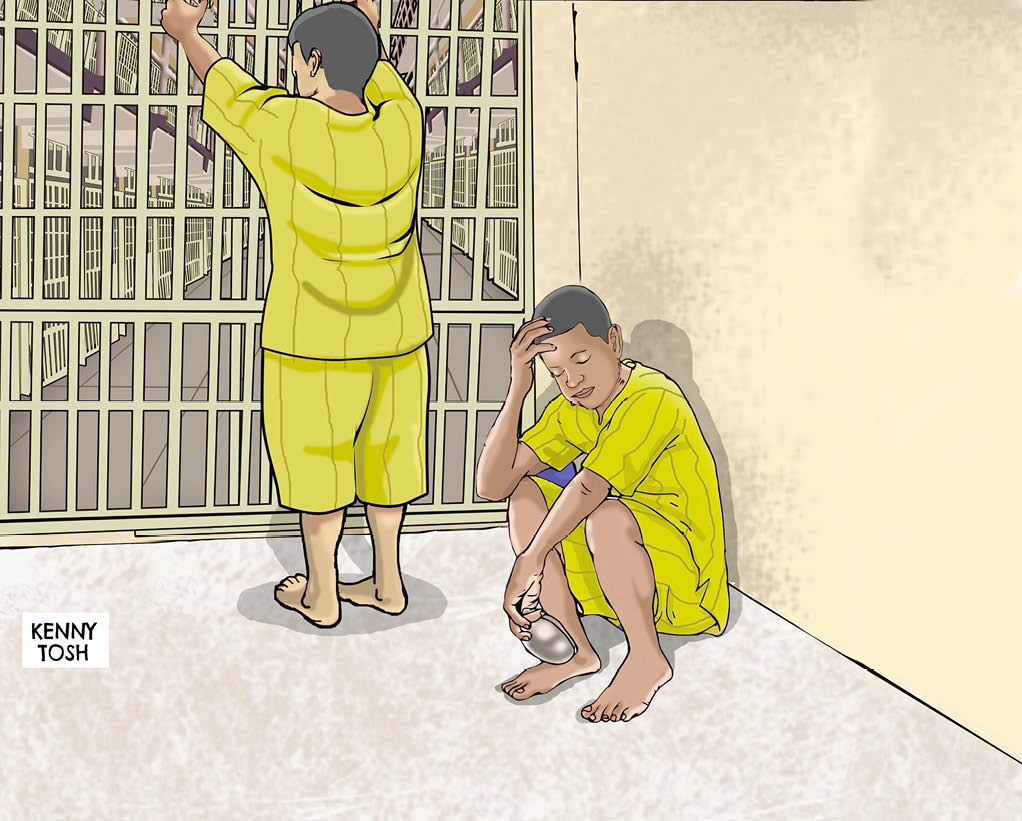Plight of minor offenders in Nasarawa correctional facility
The imprisonment of minors alongside hardened criminals in the same cells at various correctional facilities in Nasarawa State has been a cause of concern amongst judicial experts and stakeholders in the state. Daily Trust Saturday takes a look at the disturbing trend and inherent dangers in the anomaly in this report. After tenacious advocacy […]

Plight of minor offenders in Nasarawa correctional facility
The imprisonment of minors alongside hardened criminals in the same cells at various correctional facilities in Nasarawa State has been a cause of concern amongst judicial experts and stakeholders in the state. Daily Trust Saturday takes a look at the disturbing trend and inherent dangers in the anomaly in this report.
After tenacious advocacy over indiscriminate imprisonment of juvenile criminals alongside adults in Nasarawa State correctional facilities, a drastic step initiated by the state Ministry of Justice in collaboration with Law Hub Development and Advocacy Centre and Macarthur Foundation, drew participants mostly from the judiciary, law enforcement agencies and the media to fine tune ways of ensuring seamless implementation of criminal justice law in Nasarawa State.
Daily Trust Saturday observations in Lafia, the state capital, indicated that about 3.5 per cent of inmates detained in Keffi Correctional Centre are underage inmates, awaiting trial just like the almost 70 per cent other inmates.
When a justice organization visited the prison sometime last year, Christian Atsi (17), Nasir Mukaila (16) and Miracle Jonah (19) were among about 20 underaged inmates at the Keffi Prisons.
- Ministers: How power play, gang-up forced El-Rufai out
- Niger crisis: Nigeria, Benin, Ivory Coast, Senegal commit troops as AU backs ECOWAS
The three boys were joined by Abubakar Isa (17) and Ayuba Mohammed Umar (16) as they were herded out of their cells. Looking unkempt, the teenagers narrated how they found themselves in prison with adults rather than in remand homes.

Each of the boys narrated sad tales of the pains they went through while in prison. The most pitiful story is that of Atsi, a high school graduate, who became a landlord in prison rather than in an academic hostel after he reportedly fought with the son of a police officer in Mpape—a suburb of Abuja. The police officer bragged about dealing with him and a Grade 1 Area Court in Mpape permitted the ‘punishment’ by ordering a prison remand.
Our correspondent gathered that Atsi, an orphan, lost his parents who were on their way from their state, Cross River, in a ghastly road accident in 2004 on the Keffi-Abuja Highway, few kilometres from the prison where he was being remanded.
Further finding by our correspondent indicated that during that time, most of the adult prisoners claimed they were being remanded for offences bordering on public nuisance, fighting, theft, street hawking and breach of peace.
The practice of remanding underage kids in same cells as adults, some of whom are hardened criminals, has been overlooked by law enforcement officials. The situation has worsened the congestion in prisons and recycling of criminality in the society.
In Article 40 (3) (a) of the United Nations Convention on the Rights of the Child, states are encouraged to adopt the age of criminal responsibility suitable for their respective jurisdictions; 18 years is the age recognized as the age of maturity in Nigeria. The Nigerian law recognizes that the child lacks criminal responsibility and therefore cannot be prosecuted for any offence.
Also, Section 277 of the Child’s Rights Act 2003 and Section 494 (1) of the Administration of Criminal Justice Act 2015 define a child as “a person who has not attained the age of 18.”
It is against this background the Chief Judge of Nasarawa State, Justice Aisha Bashir Aliyu, warned magistrates against unnecessary remand of persons with minor and non-capital offences at correctional facilities in the state.
The Chief Judge gave the warning at a one-day capacity training on the administration of criminal justice law 2018 in Lafia, the state capital.
She said “Very soon, I will start detaining some judges who are fond of remanding juvenile persons indiscriminately with minor and non-capital offences at correctional facilities for them to feel the same pain of detaining any person unjustly. So, by this, the judges will sit up and do the needful, nobody will just keep anybody in the custodial centre for no just cause.”
According to Justice Aisha Bashir Aliyu, some of the factors hampering the smooth administration of criminal justice law was the attitude of some magistrates who she said remand persons with minor and non-capital offences at correctional facilities without an option of bail.
She, however, noted that this has contributed to congestion in correctional facilities just as she raised alarm on how Investigative Officers are indiscriminately transferred while handling cases that need their attention.
While expressing worry that lack of adequate funds has also been affecting their efforts in decongesting correctional facilities, she noted that measures are being put in place to address the issue of juvenile inmates in correctional facilities.
Speaking, the representative of the Executive Director Law Hub Development and Advocacy Centre, Dada Joshua Gbenga, explained that the project was aimed at popularizing and disseminating the administration of criminal justice law in the state, thus ensuring the implementation of its salient provisions.
On his part, the state commissioner of police, Mr Maiyaki Baba, represented by O/C legal Allu Abaku Danjuma assured that the force would ensure it gives the necessary support for seamless implementation of the Criminal justice law in the state.
In his goodwill message, the Chairman Nigeria Bar Association Lafia Chapter, Joseph Kigbu, believes that the capacity training is timely as it would go a long way in fashioning out ways of addressing grey areas in the administration of criminal justice law across the state.
In an interview with our correspondent in Lafia, the Nasarawa State Controller of Correctional Service, Mr Ibrahim Yunusa Adda, said congestion in Lafia correctional facilities has been one of their major concerns, revealing that there are over 2000 inmates in their custody against the approved number of 1,500.
On why the prison is congested, he said “So many things might have been responsible, looking at the facilities we have in the country today, no custodial centre can be said to be congested per se. We in the correctional service mostly deal with convicted inmate. Awaiting trials are products of the court because they are here on remand.
“We are only caretakers, so if you talk about congestion as a result of awaiting trial persons, yes, so many things could be responsible. We don’t prosecute, we don’t arrest. It is the judiciary’s duty, so if inmates are brought to custodial centre with valid warrants, we have no option than to accept, if it’s from a court of competent jurisdiction.”
He further explained that with the domestication of the administration of criminal justice law in the state, magistrates have been sensitized and they know that these are the provisions of the law and they would not go contrary to it.
The Controller revealed that through the collaboration of the Lafia Correctional Centre with the judicial authorities, the ministry of justice and the judiciary, they went round all the custodial centres and the chief Judge of the state was able to review the cases of all inmates in custody and about 60 inmates under his superintendence were released. Those awaiting trial, who have stayed six years and above without going to court were also all granted bail in October last year.
He added that recently, the governor of Nasarawa State, Abdullahi Sule, through the prerogative of mercy committee, recommended and approved the released of about 16 inmates who having stayed for long, and could not pay their fines, after it waved their compensation.
He disclosed that at the Lafia Correctional Centre, they have a total of about 2,057 inmates, adding that close to 1,500 are awaiting trial, while those convicted were about 600 inmates across the 13 local government areas of the state.
